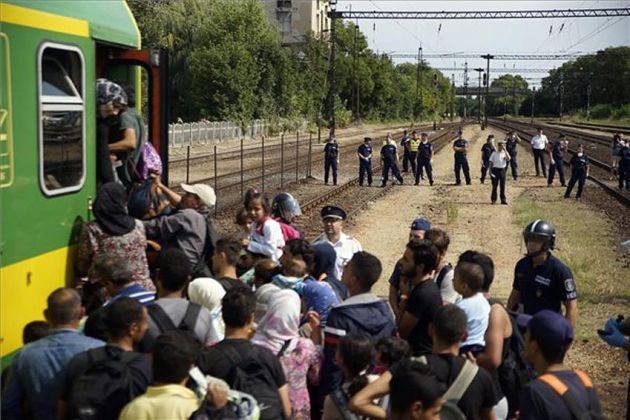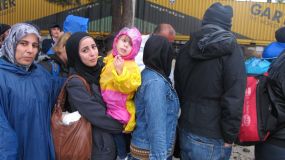Lost opportunities causing migrant crisis in Europe can still be tackled, says Pope

Last year refugees and migrants in Europe arrived in droves.
Debate about those on the move in Europe, many of them fleeing war in places such as Syria and Afghanistan, is still on the boil in 2016 with Pope Francis underscoring their plight in an address at the Vatican.
"Many of the causes of migration, "could have been addressed some time ago," the Pope noted during his Jan. 11 address to the diplomatic corps at the Holy See.
Yet today he said much "could be done to end these tragedies and to build peace."
The pontiff noted that this can be accomplished only if we have the courage to call into question "entrenched habits and practices."
Francis cited "the arms trade, the provision of raw materials and energy, investment, policies of financing and sustainable development."
In Leipzig, Germany a few hours after the pontiff spoke, more than 200 masked right-wing supporters, carrying placards with racist overtones, went on a rampage, hurling fireworks, breaking windows and vandalizing buildings, police said.
Emotions are running high in German cities after gangs of young migrant men sexually assaulted women at New Year in mass attacks in Cologne and other towns, Reuters news agency reported.
Migrant arrivals in Europe by sea averaged over 1,700 a day during the first 11 days of 2016, the International Organization for Migration said in Geneva.
The period also saw the year's first fatalities in the Mediterranean between Libya and Italy, a route that took the lives of almost 3,000 migrants and refugees in 2015.
In his address, Francis said the cry of migrants is "the cry of those who would readily return to their own country, if only there they could find adequate conditions of security and sustenance."
NEW YEAR'S EVE INCIDENTS IN COLOGNE
He did not refer to the New Year's Eve incidents of sexual harassment in Cologne, The Irish Times reported.
He did, however, acknowledge that the migration issue poses serious cultural problems.
"The massive number of arrivals on the shores of Europe appear to be overburdening the system of reception painstakingly built on the ashes of the Second World War."
Pope Francis said this is "a system that is still an acknowledged beacon of humanity.
"Given the immense influx and the inevitable problems it creates, a number of questions have to be raised about the real possibilities for accepting and accommodating people."
The Pope said questions also need to be raised "about changes in the cultural and social structures of the receiving countries, and about the reshaping of certain regional geopolitical balances.

"Equally significant are fears about security, further exacerbated by the growing threat of international terrorism," said the pontiff.
"The present wave of migration seems to be undermining the foundations of that 'humanistic spirit' which Europe has always loved and defended."
On migration, the Pope said that his thoughts continually turn to Middle Eastern Christians, "who desire to contribute fully as citizens to the spiritual and material wellbeing of their respective nations."
Francis referred to the ongoing conflict in Syria and he also used his address to praise the efforts of neighboring countries such as Lebanon, Turkey and Jordan in offering shelter to hundreds of thousands of migrants.
The Pope expressed particular gratitude to those countries, Italy among them, who have demonstrated generosity to refugees.
"It is important", he stated, "that nations in the forefront of meeting the present emergency not be left alone."